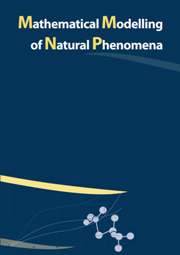Crossref Citations
This article has been cited by the following publications. This list is generated based on data provided by Crossref.
Angulo, O.
López-Marcos, J.C.
and
López-Marcos, M.A.
2011.
Numerical approximation of singular asymptotic states for a size-structured population model with a dynamical resource.
Mathematical and Computer Modelling,
Vol. 54,
Issue. 7-8,
p.
1693.
Angulo, O.
López-Marcos, J. C.
and
Bees, M. A.
2012.
Mass Structured Systems with Boundary Delay: Oscillations and the Effect of Selective Predation.
Journal of Nonlinear Science,
Vol. 22,
Issue. 6,
p.
961.
Angulo, Óscar
Bravo de la Parra, Rafael
López-Marcos, Juan C.
and
Zavala, Miguel A.
2013.
Stand dynamics and tree coexistence in an analytical structured model: The role of recruitment.
Journal of Theoretical Biology,
Vol. 333,
Issue. ,
p.
91.
ANGULO, OSCAR
MILNER, FABIO
and
SEGA, LAURENTIU
2013.
A SIR EPIDEMIC MODEL STRUCTURED BY IMMUNOLOGICAL VARIABLES.
Journal of Biological Systems,
Vol. 21,
Issue. 04,
p.
1340013.
Angulo, O.
López-Marcos, J.C.
López-Marcos, M.A.
and
Martínez-Rodríguez, J.
2013.
Numerical analysis of a population model of marine invertebrates with different life stages.
Communications in Nonlinear Science and Numerical Simulation,
Vol. 18,
Issue. 8,
p.
2153.
Angulo, O.
López-Marcos, J.C.
and
López-Marcos, M.A.
2014.
Analysis of an efficient integrator for a size-structured population model with a dynamical resource.
Computers & Mathematics with Applications,
Vol. 68,
Issue. 9,
p.
941.
Abia, Luis M.
Angulo, Óscar
López-Marcos, Juan Carlos
and
López-Marcos, Miguel Ángel
2021.
Computational Study on the Dynamics of a Consumer-Resource Model: The Influence of the Growth Law in the Resource.
Mathematics,
Vol. 9,
Issue. 21,
p.
2746.


